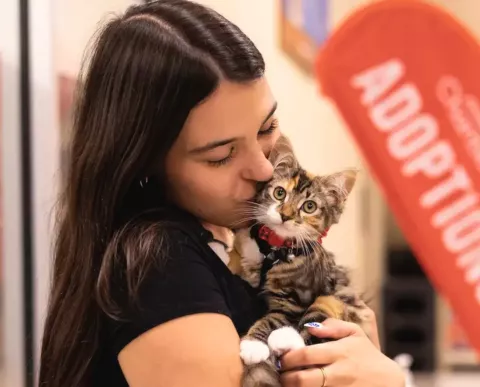Distance to the veterinarian is also a factor for pet parents
As veterinary care costs and demand continue to climb across Canada, the newly released PetSmart Charities of Canada-Gallup State of Pet Care Study revealed that half of Canadian pet parents (50%) said they skipped needed veterinary care for their pets in the past year. Among them, 31% visited a veterinarian but declined the recommended treatment, while 19% did not visit a veterinarian at all.
Today, 12 million Canadian homes include pets, a number that has climbed steadily over the past 5 years. Universally, pets are considered important family members, but all too often, families struggle to provide them with the veterinary care they need. The study found that the tendency to forgo veterinary care is most pronounced among younger pet parents: 59% of those aged 18 to 29 reported skipping or declining care. This age effect is independent of income, which does not appear to be a factor in pet parents’ likelihood to avoid care.
To better understand the veterinary habits of pets and their pet parents, as well as the barriers they face to receiving the care they need, PetSmart Charities of Canada partnered with Gallup to conduct a nationally representative study of thousands of pet parents across Canada.
The study, conducted in late 2024, interviewed over 2,000 Canadian cat and dog parents by phone and web on topics related to their experiences with veterinary care — including how often they visit the veterinarian, where they seek information about their pets’ health, whether they have declined care for their pets, and the extent to which veterinarians offer services that meet pet owners’ needs.
In 2023, PetSmart Charities of Canada committed $18 million to help fund organizations working to build capacity and create new models of care to help more pets get the vet care they need to thrive. Addressing the varied issues that prevent pet parents from accessing care for their pets requires a broad range of solutions. The study provided insights into the barriers pet parents face and solutions that may help.
Financial Factors Are the Greatest Obstacles to Care
While pet parents offered a number of reasons for declining care or not visiting their veterinarian, financial considerations outweighed them all. Among those declining care in the past year, two-thirds said it was because they could not afford it or that it was not worth the cost.
Financial considerations are common barriers for all pet parents, but the nature of these concerns differed by household income level. Pet parents in households earning $60,000 or less per year — representing the majority of respondents — primarily cited affordability as the reason for avoiding care. By contrast, those in households earning more than $60,000 were more likely to believe the proposed care was not worth the cost than to say they couldn’t afford it.
However, even those in the highest-earning households face affordability challenges: 27% of pet parents earning more than $90,000 who had declined or avoided care said they did so because they could not afford it.
Veterinarians Help Pet Parents Find Options That Fit Their Needs but Not Budgets
In addition to financial considerations, practical concerns are significant barriers to veterinary care. Twenty-one percent of pet parents who declined recommended care said it is because that care would not be practical for them or their pet — for example, the recommended treatment could cause stress for their pet, or they are not comfortable administering the treatment.
While 65% of those who found the proposed care impractical were given other options that better fit the needs of the pet or their parents, only 28% of those who declined care because of cost were offered a more affordable option. Vets care deeply about the pets under their care; this insightful data could prove helpful in their communication with pet parents, too.
Among the 20% of Canadian pet parents who had ever been referred to another veterinarian, most were referred because the pet required specialized care or access to an animal hospital with advanced equipment or expertise. However, about one in six (16%) of all those referred to another veterinarian were sent to a provider who offered discounted services or lower-cost options. Expanding low-cost options in communities across Canada would be useful for veterinary practices, whose staff may struggle when families are unable to pay for their services. PetSmart Charities of Canada and Gallup will survey veterinarians to assess their experience in the next State of Pet Care Study, slated for early 2026.
Increasing the availability of payment plans, which allow pet parents to pay for expensive treatments over time without interest, could make essential care more accessible, especially for Canadian pet parents with limited finances. However, few pet parents in Canada are currently offered payment plans by their veterinarians.
Only 21% of pet parents report their veterinarian had ever offered them a payment plan, and among those who declined veterinary care because of cost, 20% had been offered one. Similar percentages of pet parents at all income levels reported having been offered a payment plan. Offering more financially friendly options so pet parents can stagger the cost of care could prove beneficial for all, regardless of income.
Pet Parents Are Open to Non-Traditional Care Options
While finances are significant factors in accessing veterinary care, they aren't the only barrier. Some Canadian pet parents also face practical challenges, such as geographic location and limited transportation options, or concerns about trust and safety with providers, which can impact their ability or willingness to seek care.
Distance to the veterinarian is a barrier, particularly when it comes to making annual veterinary visits. Pet parents who have to travel farther to see a veterinarian are more likely to skip care. Just under half who travel less than 10 kilometres to a veterinarian (46%) have declined care or not visited in the past year. This jumps to over half for those who travel between 10 and 25 kilometres (52%), 25 to 50 kilometres (60%), and more than 50 kilometres (55%).
Despite the challenges pet parents face, most (79%) say they consult a veterinarian — either in person or remotely — when their pet is sick. However, many also seek additional input from alternative sources, such as the internet (43%), friends and family (30%), and pet professionals like trainers or groomers (22%).
Almost one in five (18%) pet parents say they only seek advice from non-veterinary sources when their pet is sick. Canadian pet parents younger than age 44 (23%) and those with annual household incomes of $36,000 or less (23%) are the most likely to fall into this category.
Pet parents are more likely to consult non-veterinary sources the farther they typically have to travel to a veterinarian: 13% of those travelling less than 10 kilometres seek advice from non-veterinary sources, compared with 19% of those travelling between 10 and 25 kilometres, 21% travelling 25 to 50 kilometres and 28% travelling over 50 kilometres.
While few pet parents have used community clinics, home veterinary visits or telemedicine — reflecting the limited availability of these options — about four in 10 would use telemedicine or home visits, and a third would use community clinics, if they were available.
These findings suggest virtual veterinary care or community clinics could help fill care gaps, especially with pet parents who face challenges with in-person visits. Telemedicine and community clinics can improve access to veterinary care in Canada, particularly in rural and Northern areas, where geography and clinic capacity often limit availability.
Implications
The PetSmart Charities of Canada State of Pet Care Study highlights significant barriers to care in Canada’s current veterinary system — chiefly, the rising costs and the perceived impracticality of treatments.
For pets with ongoing health needs, community clinics and virtual consultations could potentially reduce the burden of frequent travel, lower costs and make it easier to manage chronic conditions. However, awareness, availability and regulation of veterinary telemedicine and community clinics still vary widely across provinces, and not all clinics offer these services, highlighting a potential area for policy and infrastructure development in Canadian pet health. Learn more about how PetSmart Charities of Canada is approaching the issue, and our $18 million commitment.
Learn more about how the PetSmart Charities-Gallup State of Pet Care Study works.







